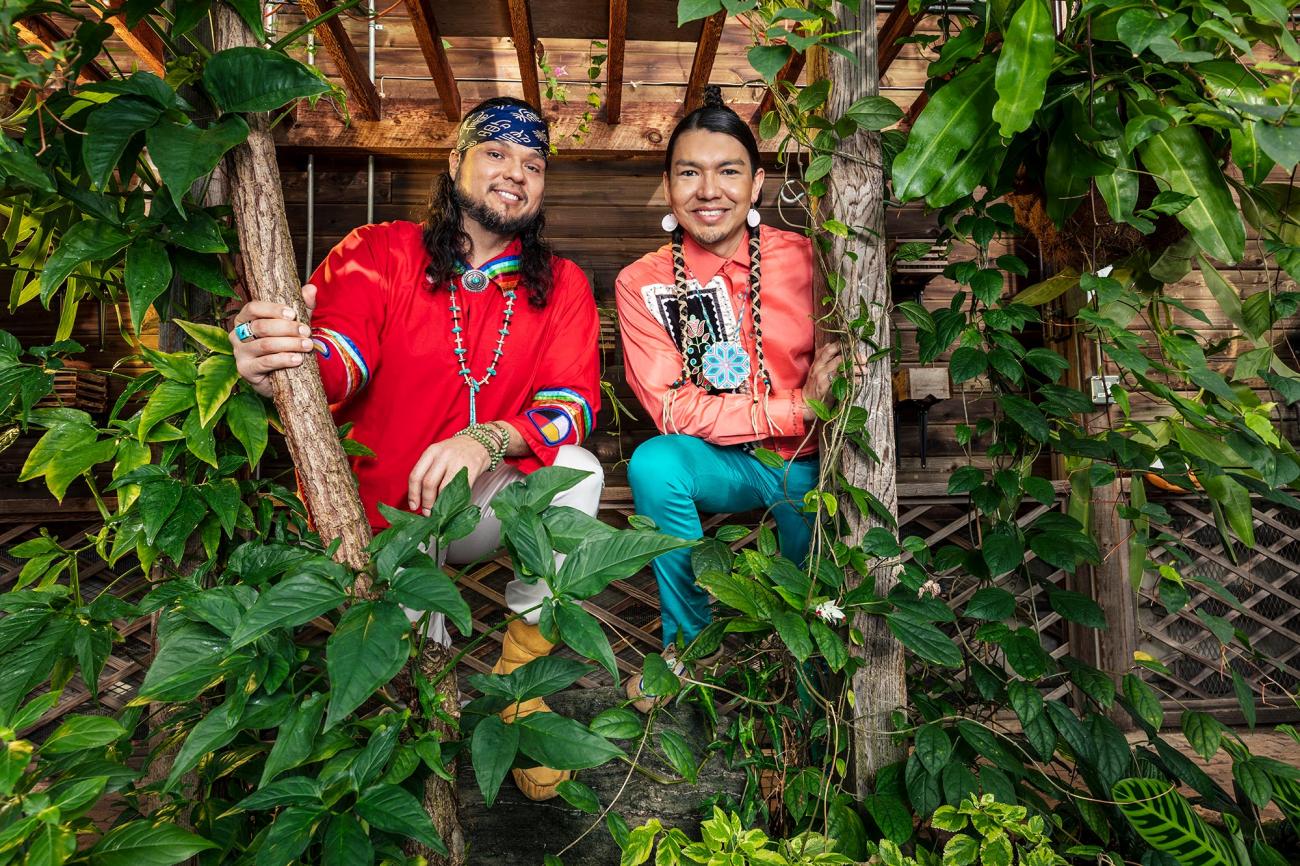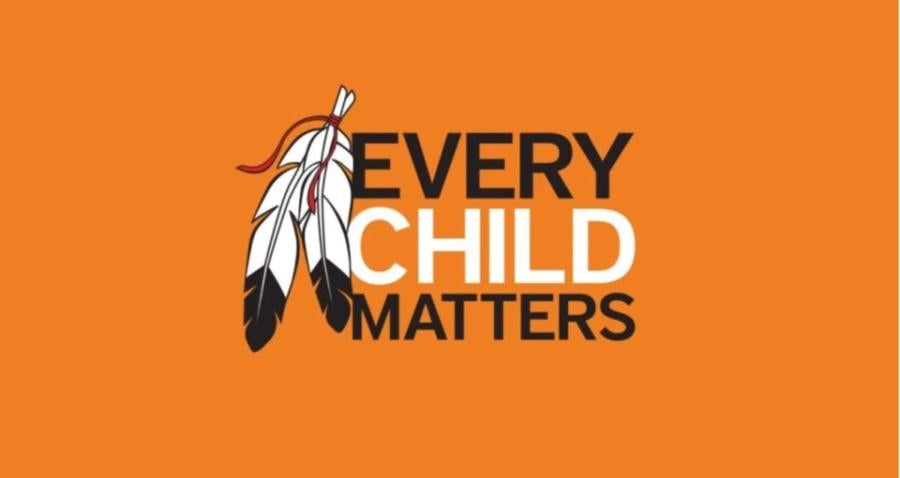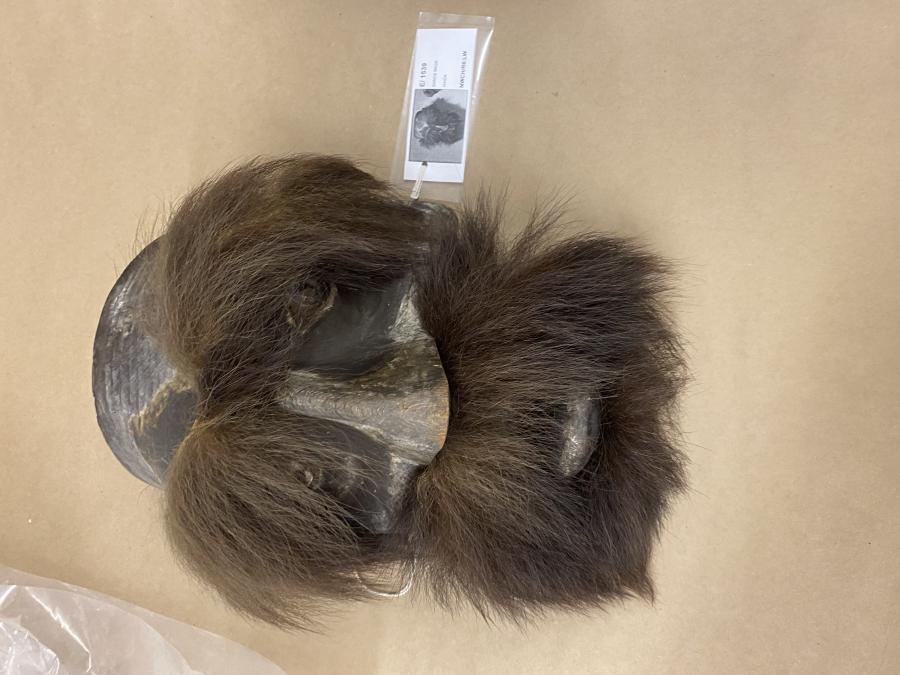
After becoming the first Two-Spirit Indigenous couple to win The Amazing Race Canada, Anthony Johnson (Diné) and James Makokis (Saddle Lake Cree) are embarking on new ways to share their positivity and multifaceted identities through television. In June 2021, the couple formed a development deal with Indigenous storytelling production company, Wapanatahk Media. Together they will produce a factual series that follows Johnson and Makokis as they pursue their mission to educate the masses about Indigenous cultural teachings. They will welcome Canadians into the home that they built with The Amazing Race Canada prize money, Nizhoni Acres, to embark on their own transformational journeys.
Cultural Survival’s Indigenous Rights Radio Coordinator, Shaldon Ferris (KhoiSan) recently spoke with Makokis and Johnson.
Cultural Survival: Could each of you give us an introduction and tell us a bit about you?
James Makokis: I'm from the Saddle Lake Cree nation in northeastern Alberta (sorry, I'm just going to turn off those notifications), from the Saddle Lake Cree nation in northeastern Alberta. There's about 6000 people that live on our reserve. I grew up there. I'm a Two-Spirit family physician. I worked in Kehewin Cree Nation, which is also in northeastern Alberta in Treaty Six and in South Edmonton, where I do transgender care, and also the medical director of Shkaabe Makwa at the Center for Addiction and Mental Health in Toronto and I’m Anthony's husband. We've been married for four years now and one half of Team Ahkameyimok [in Cree: “Don’t give up, keep going, use whatever you have to get something done”], which was on season seven of The Amazing Race, Canada.
Anthony Johnson: I'm from the Navajo Nation, the Diné Nation in the southwest United States. And currently I live in Treaty Six territory, among the Cree people, and Anishinaabe, many other nations as well. I'm married to James Makokis. And my resumé is not as exciting as his, I'll have to admit, but I do do cultural development work and consulting. So my job currently is to help rebuild Indigenous midwifery in Kehewin Cree nation, which is located three hours east of Edmonton in rural Alberta. And I'm really excited to be here and talk to you today.
Cultural Survival: Neither of you mentioned in your introduction that the two of you are celebrities now, and that you won The Amazing Race, Canada?
James Makokis: OK, yes, we are the most recent winners of Season Seven of The Amazing Race, Canada, which made us the first Two-Spirit, married, Indigenous couple in the world to win that reality series. But we were really excited to be able to bring different messages forward about Indigenous Peoples and gender diverse Peoples and from the Two-Spirit community as well.
Anthony Johnson: Yeah, definitely, being on this show was an incredible experience to represent Indigenous people, queer folk, missing and murdered Indigenous women. But I'd say that for me, the biggest reward has been after the show, with all the feedback that we've received. We do quite a bit of public speaking now to help educate Canadians and Americans about various issues regarding Indigenous rights, the history of Indigenous Peoples in North America, and really what it's like to be an Indigenous person living in Turtle Island today. Which really focuses around how we navigate the world, maintaining our cultural identity, while having to deal with a lot of the issues that Indigenous people face legally, socially, culturally, economically. And so I'm really grateful for my time on The Amazing Race and our time together, because it really gave us the opportunity to make a difference in the world, that I feel like our elders wanted us to growing up.
Cultural Survival: Tell us about the collaboration between yourselves and Wapanatahk Media.
Anthony Johnson: Wapanatahk Media was recently founded by Tania Koenig-Gauchier and Shirley Mclean, who approached James to kind of talk about his work as a physician. And by the time we engaged in conversation with them, we'd been on The Amazing Race and they thought, wow, here's an opportunity to share Indigenous stories, which is why Wapanatahk Media was founded in the first place. The aim of the production company is to highlight Indigenous content in North America, to elevate Indigenous voices, and to really let audiences see a different kind of Indigenous storytelling that up until this point hasn't existed. And so after The Amazing Race, we helped, worked with them to develop a concept for a show where we work with a few lucky participants from Canada and possibly the United States. And what we're helping them do, is go on a once-in-a-lifetime adventure to create transformation in their lives. You know, partnering with celebrities, with different coaches, and really using the teachings from the land as a mechanism to promote personal development. We're working with elders in the project to really highlight the power of Indigenous culture, and that's the side of our Peoples' story that we want to share and give people an opportunity to experience.
Cultural Survival: Tell us about the importance of Indigenous Peoples telling their stories through their own production companies.
James Makokis: One of the things that we've learned in the, the after part of being on The Amazing Race Canada is how interested and engaged Canadians and non-Indigenous people are about learning of Indigenous history or Indigenous ways of being or Indigenous healing or Indigenous connections with the land. And, you know, because that's the part that so many people have not had the opportunity to learn in school or, you know, in other places. And I think especially now with what's happening in the political climate and the social climate, especially in Canada in particular, around the uncovering of Indigenous children in graves at residential schools, that is coming out into the media. More and more we're hearing that non-Indigenous people are really interested and engaged about learning more of these issues. And this is an opportunity to highlight the positive, the many, many positive aspects of Indigenous culture and healing practices and sharing information and education with non-Indigenous and Indigenous people. I think it's an exciting time to be able to do that because there is a thirst for that knowledge in an authentic way, that portrays people in a positive way doing things that we know our people do regularly in the community, but just the mainstream population never had the chance to see or participate in. So I think there's a huge need for that. And then part of being on The Amazing Race Canada, is our cast was so diverse that it really helped to bring the ratings to a new level than they had seen since season two. So I think that speaks to the interest that people do have in seeing diverse presence in the media and that what Wapanatahk Media is also ensuring that they capture in terms the BIPOC employees and people that would be part of production.
Anthony Johnson: I think it's really important to also acknowledge the fact that for, you know, in the more than 100 years since, the media has only existed in its current incarnation. Right. From radio stories, you know, back in the early nineteen hundreds up until now, our stories have been told by other people. Our stories have been painted in a way that, you know, create Indigenous people to be characterizations of who we actually are. And the amazing part of working with Wapanatahk is, first of all, it's an Indigenous name. It's founded by two Indigenous women. Their aim is to elevate people from the BIPOC community into, you know, means of production. And the show and the company that we're working with are all about developing the infrastructure of media that we've really been prevented from participating up until recent times in recent memory. And so having new content, new perspectives and new stories to tell is really a demonstration that Indigenous people are moving forward in the twenty-first century, we're carving out our own piece of the industry and through that hard work, we're able to paint a story of ourselves that is real and multi-dimensional and conveys who we believe ourselves to be rather than what other people think we are.
Cultural Survival: Can you tell us about the proposed production - why a series -how many episodes in the series - what will each episode be about?
James Makokis: Sure. So this is going to be a nonscripted series that is in a development phase at the moment. We have some broadcasters that are interested. And Wapanatahk Media is in discussion with many potential partners to, to develop the show. And so that's the exciting part of it, is that there are some basic principles which we have of wanting to improve people's life and get them excited and energized and motivated to make positive changes in their life with having different coaches available and part will be filmed at our home, which is Nizhoni Acres. Nizhoni in the Diné bizaad, which is Anthony's language, means a beautiful faith. And maybe he could explain it a little bit better. But, you know, it involves coming to our home because it is a community space, it's a ceremonial space, it's an educational space, and then taking them on various adventures and having different supports in place to help with their personal growth and development. So it's, it's open to changing. But those are, I think are the main principles that we wanted to highlight on this show. And Anthony probably will be able to add a bit more.
Anthony Johnson: Yeah, I just say that the heart and soul of the show is really giving people a time out and a space to enter a place of transformation. That's the technology behind ceremony. That's the technology behind the different ways that we practice healing as Indigenous people. And taking time out to reflect and get support, to have community around you. And so the concept of the show is really to bring an individual who wants to create transformation into their lives, bringing them through Nizhoni Acres, because, again, Nizhoni means beauty, it means harmony, it means peace, it means tranquility, it means abundance. And so bringing them to our home to kind of get them in the right mindset so that we set them up with different coaches and celebrities so they can go on a once in a lifetime journey and just have a breakthrough in some area of their lives. And of course, there's a big reveal and everything that comes with that. So we're keeping the idea open to working with different broadcasters right now, but that's the concept of the show. It's really about healing and transformation and exposing people who are non-Indigenous to the way that our ceremonies work. And also for them to see the power and the connection that we have with elders and really just to show them a slice of our life.
Cultural Survival: Where in the production process are you now, and what is the plan for distribution?
Anthony Johnson: Right now we're in preproduction. So far, we've developed a Bible, the treatment, we've been working with our media, our PR company, to talk about this idea and the project. But one of the cool thing is that our home, you know part of the winnings that we used with The Amazing Race Canada was to invest in our home because there were some issues that didn't work for us. We wanted to make it more accommodating to outside visitors. And so what we're doing now is we're filming the renovation of our home with the Marilyn Denis Show, which is a nationally broadcast daily television show, in Canada. Daily, Marilyn brings in anywhere from 1.5 to 2 million viewers. And so that audience is getting to see our home transform on television and they'll get to see the follow up to that when we start shooting the series. We've been literally standing in an interior design store right now, looking at fabrics and carpets for our couch.
James Makokis: We've been out of our house for the past six months, so we are excited to get back into the space and for our little dog, Lucy, to be able to run around again. She misses the backyard.
Cultural Survival: What are your plans for the future, what are your plans for this newly found celebrity - any plans for future series?
James Makokis: Well, right now, we're focused on completing our home, the Nizhoni Acres, and putting a lot of our energy into that. Anthony and I do a lot of speaking engagements with different corporations or organizations or educational institutions, really sharing our story on The Amazing Race Canada, some of the strategies that we used to be able to win, but also what helps us to be... What has helped us to be successful in our own lives, which is really founded in our cultural teachings, you know, and things that we participate in and being able to share that with people who are interested. And then, you know, in the future, hopefully developing a land base camp where... A land-based leadership camp where people can come and learn and have the opportunity to be immersed in a lot of these teachings that we've been able to, be afforded to you by spending time with elders and things like that. So it's a pretty busy time. We're really excited to be a part of this series, this potential series, and I'm really happy to be doing that with my husband.
Anthony Johnson: Yeah, I'm really excited. I love that I get to work with my husband. And I would just say we are not celebrities, or if we are celebrities that like, you know what, below the D-List, like you get into shapes, what what is that place? But I just think it's exciting for me. I'm really excited about the fact that people are listening to Indigenous stories and taking Indigenous issues in a new way. And that's really what our ancestors fought for, for the past five hundred years in North America. And I think now's the time where it's a call to leadership, a call to leadership for us personally. To step into who we fully are and a call to leadership for the people of Turtle Island, both Indigenous and non-indigenous, to step into the truth and really create a new reality moving forward. And if we get to film that, and if we get to create work around that, that's just the cherry on top of the icing.
Photo courtesy of Anthony Johnson and James Makokis.



